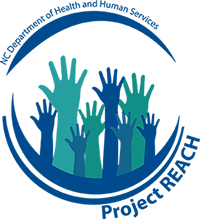

 Teen Pregnancy Prevention Initiatives (TPPI) received funding from the Office of Adolescent Health (OAH) in 2015 to implement evidence-based programs in areas with high teen birth rates. TPPI identified three county health departments to work with to implement programs through the local school systems. The program is called REACH (Redefining & Empowering Adolescent and Community Health).
Teen Pregnancy Prevention Initiatives (TPPI) received funding from the Office of Adolescent Health (OAH) in 2015 to implement evidence-based programs in areas with high teen birth rates. TPPI identified three county health departments to work with to implement programs through the local school systems. The program is called REACH (Redefining & Empowering Adolescent and Community Health).
The two remaining REACH sites in Edgecombe and Richmond counties provide key educational interventions to improve NC adolescents’ knowledge, attitudes and beliefs regarding sexual health, which will impact adolescent birth rates in these counties. The programs will also aim to increase the number of youth seeking services at the local health department clinics and increase the access to the most effective birth control methods. Local staff in each county are responsible for implementing evidence-based programs in three separate settings within their communities (example schools, community centers, and/or churches) that best fit their community’s needs. Approximately 1,500 youth are expected to be served through REACH per year. Please see additional information and program highlights below.
Contact us for additional information about Project REACH.